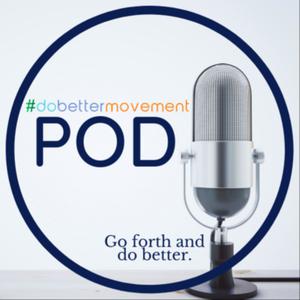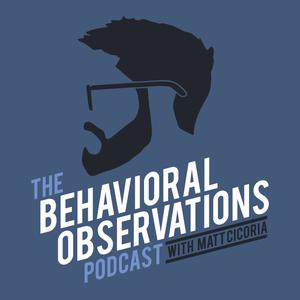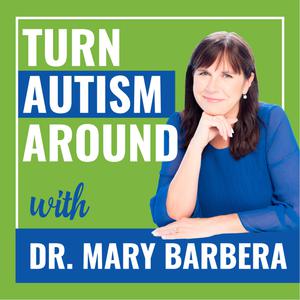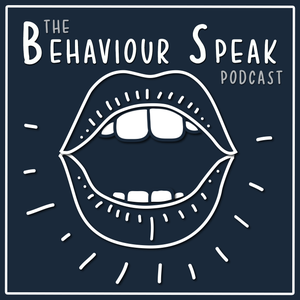
#dobetter Pod
Megan Miller & Joe Smith
A professional development initiative for behavior analysts
- 44 minutes 42 secondsDo Better Podcast Live Nov 2024: Conferences, Behavioral Neuroscience, and AI
In this Episode, Dr. Megan and Joe catch up on a variety of topics: conferences, Behavioral Neuroscience, and AI!
Key Takeaways
- Do Better Collective is hosting a month-long "Rejected Conference" in December with 30+ presentations and 40+ CEs available
- Megan presented on behavioral neuroscience and rethinking functions of behavior at the recent Disrupt ABA conference
- Integrating neuroscience concepts into ABA practice can improve understanding of client behavior and treatment approaches
- AI tools like ChatGPT are helpful for organizing ideas and creating contentTopics
Rejected Conference Details
- Runs Dec 1-19 with 30+ presentations on diverse ABA topics
- 40+ CEs available, including many ethics CEs
- Flexible pricing ($50-200) with scholarship options
- Free for Trailblazer members who share about the conference
- Presentations cover wide range of topics: ethics, group learning, precision teaching, neurodiversity, etc.
Behavioral Neuroscience in ABA
- Megan presented on integrating behavioral neuroscience concepts into ABA practice
- Focus on understanding nervous system regulation (sympathetic vs parasympathetic states)
- Importance of addressing neuroscience/regulation before attempting to teach skills
- Created resources on screening for neuroscience factors and connecting to ABA
AI Tools for Content Creation
- Megan and Joe use ChatGPT to organize ideas and create content
- Voice-to-text features helpful for capturing thoughts while driving
- AI can help structure "word vomit" of ideas into coherent content
Podcast Schedule
- May skip December episode due to holidays
- Considering moving to Wednesdays in 2025 based on audience feedback
Next Steps
- Megan to share behavioral neuroscience resources and possibly do webinar in January
- Send survey about moving podcast to Wednesdays in 2025
- Promote upcoming Rejected Conference in December
28 January 2025, 8:25 pm - 48 minutes 40 secondsDo Better Pod Live Oct 2024: Motivational Interviewing with Callie Plattner
In this episode, Dr. Megan and Joe interview Callie Plattner about Motivational Interviewing!
AI SUMMARY FROM FATHOM Key Takeaways - Motivational interviewing (MI) is an evidence-based communication approach that can significantly enhance therapeutic relationships and outcomes in behavior analysis - MI skills (OARS: Open-ended questions, Affirmations, Reflections, Summaries) require intentional practice but can be transformative for client interactions - Recent research shows strong social validity for integrating MI into ABA training and practice, addressing known skill deficits in therapeutic alliance building Topics Background and Relevance of MI in ABA - Multiple recent studies (2018-2023) highlight BCBAs' lack of skills in building therapeutic relationships - Less than 6% of surveyed BCBAs had practical training in MI-related skills during education - MI has extensive evidence base in other helping professions (e.g., addiction treatment, healthcare) - Key MI outcomes align with ABA needs: increased treatment adherence, goal clarity, session attendance Core MI Skills (OARS) - Open-ended questions: Elicit detailed responses beyond yes/no (e.g., "Tell me about your weekend") - Affirmations: Recognize client strengths and efforts (e.g., "You're clearly a dedicated parent") - Reflections: Demonstrate active listening and check understanding (e.g., "It sounds like you're worried about...") - Summaries: Synthesize key points and transition topics Implementing MI in ABA Practice - Pause before offering solutions; ask additional questions and reflect to ensure full understanding - Use OARS flexibly, not necessarily in order - Practice in various contexts (e.g., emails, casual conversations) to build fluency - Adjust approach based on individual client communication preferences Research and Training Developments - 100% of BCBAs in a study agreed MI skills should be developed in the field - Organizations like Mosaic Pediatric Therapy integrating MI into staff training and onboarding - Growing number of ABA-specific MI resources and conference presentations emerging Next Steps - Attendees encouraged to explore MI resources shared during session (articles, books, recorded trainings) - Consider attending upcoming MI workshops (e.g., Stone Soup Conference, Maryland ABA in December) - Potential future Do Better workshop on MI with Callie Plattner in 2025 - Field to continue work on incorporating MI into ABA coursework, fieldwork, and continuing education
28 January 2025, 8:16 pm - 54 minutes 10 secondsDo Better Pod Live Jan 2025: Catching up and Parenting
On this episode of the Do Better Podcast, Dr. Megan and Joe catch up and discuss Parenting issues we face as behavior analyst.
Key Takeaways
- The group tentatively selected a mountain goat as Do Better's mascot, symbolizing persistence and overcoming obstacles
- Parenting as a behavior analyst involves balancing analytical thinking with being present as a parent
- Contextual, collaborative approaches to parenting that explain rationales and teach problem-solving skills are preferred over rigid rule-setting
- Helping neurodivergent children navigate societal expectations while honoring their authentic selves is an ongoing challenge
Topics
Mascot Selection -
Mountain goat emerged as leading choice, representing persistence and overcoming challenges
- Other suggestions included owl, fox, wolf
- group favored an animal aligned with "trailblazer" theme
- Plan to create cartoon version; name suggestion "Doby" (pronounced "dough-be")
Parenting as a Behavior Analyst
- Challenge of balancing analytical thinking vs. being present as a parent
- Example: Flexibility around bedtime snacks, considering medication effects on appetite
- Importance of contextual decision-making rather than rigid rules
- Teaching children to make requests in advance and respect parents' time/planning needs
- Setting clear family values (e.g. "we don't lie") and explaining rationales behind rulesSupporting Neurodivergent Children
- Difficulty navigating societal expectations while honoring child's authentic self
- Explaining "neurotypical standards" as arbitrary social constructs
- Teaching self-advocacy skills when possible
- Using resources like Go Zen to address issues like negativity from a neurological perspective
Next Steps
- Finalize mascot selection and create cartoon version
- Schedule February podcast to discuss decision fatigue and long-term thinking in parenting
- Megan to upload full Do Better event calendar for the year by January 31st
28 January 2025, 7:58 pm - 51 minutes 14 secondsDo Better Pod Live Sept 2024: Conferences and New Clinical Resource!
In this episode Joe and Dr Megan discuss 2 upcoming conferences and a new clinical resource Dr. Megan created for FABA. Check out the links below and enjoy the show!
Conference Info:
1. CPABA
2. Rejected 2024 --> No Link yet but stay tuned for details!
AI Summary from Fathom
Meeting Purpose
Record a podcast episode discussing upcoming ABA conferences and new resources for practitioners.
Key Takeaways
- CPABA conference (Oct 11-12) offers 90+ CEs and aims to bring together diverse perspectives in ABA
- "Rejected" conference planned for December to highlight practitioners and rejected presentations
- New "Do Better Field Guide" resource created with tip sheets and checklists on key ABA topics
- Multiple ABA conferences coming up, offering opportunities for learning and networking
Topics
CPABA Conference
- Online conference Oct 11-12 with 90+ CE credits available
- Aims to bring together differing perspectives on ABA topics
- Panels on ableism, autism diagnosis, participatory research, ethics, social media impacts
- Discount code DELEON2024 for 10% off registration
- Recordings likely available after (to be confirmed)
Overview"Rejected" Conference
- Planned for December 2024, online format
- Goal: Highlight practitioners and presentations rejected from other conferences
- 1-2 hour time slots throughout month
- Likely free for members, donation-based for non-members
- Aiming for accessibility features (e.g. sign language interpreters)
- Registration for presenters opening in October, attendees in late Oct/early Nov
Do Better Field Guide Resource
- New resource with tip sheets and implementation checklists
- Topics: language development, assent, emotional regulation, NET, toilet training, assessment, parent coaching
- Designed for newer BCBAs to "hit the ground running"
- Additional niche-specific guides may be developed in future
Other Conference Mentions
- ABA Reimagined conference in February (online)
- APBA conference in Dallas end of March
24 September 2024, 6:20 pm - 58 minutes 24 secondsDo Better Pod Live Recording - Interview with Amanda "Mandy" Ralston
In this episode Dr. Megan and Joe had the pleasure of interviewing one of the most innovative behavior analysts there is: Amanda "Mandy" Ralston. Our conversation focused on the new technology Amanda has created that is changing the landscape of how we develop treatment plans as behavior analysts. Tune in to find out more!
LINKS TO LEARN MORE ABOUT AMANDA:
Meeting purposeLive recording of the "Do Better Podcast" featuring guest Amanda "Mandy" Ralston discussing her innovative AI-powered clinical decision support software for behavior analysts.
Key Takeaways
- Knowetic is a pioneering clinical decision support system for behavior analysts, offering standardized intake, goal development, and treatment intensity forecasting
- The software aims to enhance clinical decision-making by providing AI-assisted record review and recommendations based on 25+ years of practitioner experience
- Knowetic addresses the complexity of autism and co-occurring conditions, emphasizing individualized, holistic treatment planning
- The platform will incorporate standardized assessment tools (e.g. BHI) and aims to gather data to improve treatment outcomes across the field
Introduction to Knowetic AI
- Knowetic is a subscription-based software platform for clinicians
- Three main modules: care navigation, goal development, and intensity forecasting
- Provides standardized intake process and builds behavioral profiles
- Offers treatment recommendations based on 25+ years of clinical experience
- Emphasizes clinician decision-making, not replacing clinical judgment
KnowYeti AI Assistant
- HIPAA-compliant chatbot within Knowetic
- Quickly reads and summarizes uploaded patient documents
- Assists with record review and treatment plan writing
- Does not access internet or retain information between sessions
Data Collection and Future Development
- Standardized data collection allows for comparison across patients
- Future plans to employ machine learning for pattern recognition and outcome prediction
- Collaboration with Dr. Hanley to incorporate BHI (Behavioral Health Index) into the software
Expanding ABA Beyond Autism
- Discussion on applying behavior analysis to other fields (e.g., substance abuse, human trafficking)
- Emphasis on research, data collection, and dissemination to expand ABA's reach
- Networking and interdisciplinary collaboration as key to expanding influence
Amanda Ralston's Career Journey
- 25+ years of experience in behavior analysis
- Transitioned from clinical practice to tech entrepreneurship
- Extensive networking and public speaking leading to diverse opportunities
Next Steps
- Interested parties can sign up for a demo of Knowetic at Knowetic.ai
- Follow Amanda Ralston on social media for updates (LinkedIn, Instagram, Facebook)
26 August 2024, 6:13 pm - 48 minutes 34 secondsDo Better Pod Live: Where do you see the field in 6 Years?
At the CARES conference hosted by United Caring Partners, Dr. Megan had the pleasure of sitting on a panel presented by the folks at ABA Inside Track and the last question of the panel was: In 6 years, what do you hope to see at this conference? In today's episode, Dr. Megan, Joe, and members of the Do Better Collective discuss how they would answer this question.
We want to know your answer! Comment and let us know what you hope to see in 6 years in the field of ABA!
AI NOTES FROM FATHOM:
Meeting PurposeLive recording of the Do Better Podcast to discuss the vision for the field of behavior analysis in 6 years
Key Takeaways
- AI and ethical utilization of AI in ABA service delivery is a critical area the field needs to address
- More robust training/supervision requirements and opportunities for BCBAs, focus on developing problem-solving skills
- Increased emphasis on family systems, human development, and avoiding pathologizing in training
- Conference speakers should highlight more practitioner work rather than just research
- Include more focus on adult services as clients grow older
AI Utilization
- Field needs guidelines on ethical, HIPAA-compliant use of AI for reducing burnout, increasing efficiency
- Payers may utilize AI first if field does not get ahead of it
- Opportunities for AI to support data collection, treatment planning, flagging non-individualized programming
BCBA Training
- Need more robust training requirements beyond just passing exam
- Potential internship model, assigned mentors, focus on applied skills
- Conference sessions/discounts to engage current BCBA candidates
Human Development & Family Systems
- Increased emphasis on human development to avoid pathologizing
- Training on working with entire family system, not just client
Conference Focus
- Shift towards practitioner speakers sharing actual clinical work
- Include local providers, not just recurring list of presenters
- Representation of all perspectives - race, disability, gender, etc.
23 July 2024, 5:33 pm - 58 minutes 47 secondsDo Better Pod Live Recording June 2024: How do you feel when you complete a task?
In this episode of the Do Better Podcast, Dr. Megan and Joe and members of the Do Better Collective discuss how it feels to complete a task based on an IG post about the differences people experience in feeling proud of finishing something. They also explore the research on whether it is better to focus on the process or the outcomes.
AI SUMMARY FROM FATHOM:
Meeting PurposeLive recording of the Do Better Podcast to discuss feeling a sense of accomplishment or pride when finishing tasks
Key Takeaways
- Some feel a sense of pride/accomplishment when completing tasks, while others feel more relief at getting it done
- Neuroscience research shows focusing on the process rather than outcomes leads to greater happiness/wellbeing
- Our field heavily emphasizes outcomes (e.g. meeting goals) over reinforcing the process of problem-solving creatively
- Shifting to reinforce process over product could reduce burnout and increase motivation/effectiveness
Differing Experiences of Accomplishment
- Joe can feel accomplished crossing items off lists, but it's more about organization than happiness
- Hannah uses lists for visual support but doesn't feel joy crossing items off
- Megan used to feel immense pride completing tasks when starting Do Better, but now feels more relief
- Jennilee doesn't feel accomplishment unless there's an element of competition
Neuroscience on Process vs Outcome Focus
- Research shows focusing on the process of an activity (e.g. problem-solving) leads to more happiness than focusing solely on the end outcome/product
- Our capitalistic society heavily emphasizes and reinforces achieving outcomes/production over the process
- This outcome focus likely contributes to burnout and reduced wellbeing in our field
Shifting Practice to Reinforce Process
- We could adjust how we train/supervise staff to reinforce creativity, problem-solving, and the journey rather than just meeting targets
- For clients, we could reinforce engagement in activities rather than just correct responses
- Doing this requires a mindset shift, but aligns with increasing focus on client happiness/quality of life
Next Steps
- Explore creating a workshop/training for collective members on restructuring practices (evaluations, supervision, etc.) to reinforce process over outcomes
- Individually reflect on how to build in more process-focused reinforcement and metrics
- Continue this philosophical discussion as it could go much deeper
11 July 2024, 1:03 pm - 50 minutes 17 secondsDo Better Pod Live May 2024: Interview with Vanessa
In this Episode of the Do Better Podcast, Dr. Megan interviews Vanessa Magallanez, BCBA about using ACT and Parent Coaching. Tune in to learn more!
AI Summary from Fathom:
Live recording of the Do Better Podcast to interview Vanessa Magallanez about incorporating Acceptance and Commitment Therapy (ACT) into her practice as a behavior analyst and parent coach.
Key Takeaways:
- Identifying and connecting with personal values is crucial for meaningful behavior change
- ACT helps practitioners understand the inner experiences (thoughts, emotions) driving behavior
- Focusing on the process rather than outcomes leads to more success and happiness
- Practitioners should reflect on whether services align with clients' values
Background and Getting into ACT
- Vanessa started incorporating ACT 2-3 years ago to better support parents
- Initially unsure if using ACT was within her scope, but saw positive results
- Biggest influence was realizing focus was too much on the child, not enough on parent perspective
Recommended ACT/Parenting Resources:
- The ACT Made Simple book
- Good Inside by Dr. Becky Kennedy
- Go Zen website with interactive ACT-aligned activities for kids
Incorporating ACT into Practice:
- Identifies client values and translates into actions/goals
- Focuses on present moment awareness and non-judgmental acceptance
- Helps parents reconnect with their identity beyond just being a parent
- Uses conversational, natural language rather than technical ACT terms
Goals and Branching Out:
- Create more vocational/community opportunities aligned with client interests
- Supervise BCBAs to expose them to diverse populations (criminal justice, mental health)
- Build rapport, be open to different experiences
11 July 2024, 12:55 pm - 26 minutes 3 secondsDo Better Pod Live March 2024 - Spring Cleaning
In this episode of the Do Better Podcast, Megan and Joe discuss Spring Cleaning with Do Better Trailblazer Member: Hannah Skillman.
AI Summary from Fathom:
Meeting Purpose:Live recording of the Do Better podcast focused on spring cleaning and organizing physical and digital spaces.
- The podcast will not have an April recording due to Megan's upcoming conferences and travel. They will resume in May.
- Everyone struggles with organizing and deleting digital files and photos. Having too many can be a form of "digital hoarding."
- Strategies like arranging an enjoyable environment with snacks and entertainment can help motivate organizing tasks.
- Getting input from others on whether to keep clothing items can help with decision making during closet cleaning.
- Considering colors that flatter you when shopping and cleaning out clothes can streamline the process.
- Some items have sentimental value and are hard to part with. Setting them aside in a special place can help.
- No topic is off limits for applying behavior analysis!
- Everyone struggles with large numbers of photos and files on devices and wants to delete duplicates.
- Hard to delete when unsure if it's backed up elsewhere already.
- Can be a form of "digital hoarding" to keep too many files.
- Strategies like snacks and entertainment can help motivate organizing tasks.
- May have monetary costs for extra storage if not deleting files.
- Getting input from others helps decide what clothing to keep or toss.
- Considering what colors flatter you can streamline closet cleaning.
- Some items have sentimental value and are hard to discard.
- No topic is off limits for applying behavior analysis!
- Challenge listeners to come up with a topic we can't tie back to ABA.
- Share organizing tips and what worked to declutter physical and digital spaces.
- Listeners to share topics they think can't be connected to behavior analysis.
10 July 2024, 8:13 pm - 1 hour 34 minutesVB vs RFT Reboot
This is a reboot of our 2nd ever episode on the divide between Verbal and Relational Frame Theory. Enjoy!
9 April 2024, 9:10 pm - 55 minutes 39 secondsDo Better Podcast Live Feb 27th, 2024 - Somatic Movement with Iveth
In this episode, Joe and Dr. Megan interview Iveth who is a BCBA practicing as a woman's empowerment coach. Iveth explains her journey with Somatic Movement and how it can affect how we understand ourselves and our clients.
Follow Iveth on Instagram:
@empowerwithiveth
@emotionawareaba
Links Shared in the Show:
Youtube Video on Healing Trauma: https://youtu.be/FKrCe9fHsSc?si=o-njPb_t8Gwhc8jk
Body Keeps the Score Book: https://www.amazon.com/Body-Keeps-Score-Healing-Trauma/dp/0143127748
It Didn't Start with You Book: https://www.amazon.com/Didnt-Start-You-Inherited-Family/dp/
YouTube Video on Somatic Therapy TedX Talk: https://youtu.be/UU7eSxcBhpM?si=54rjTfOfmJvivOjg
Social Emotional Resources Google Doc: https://docs.google.com/document/d/18UcU8OXFwyEEjRGAXvxxaxSu_cIriMJIUs4QqYegqqs/edit?usp=drive_link
Emotional Regulation Website: www.gozen.com
Summary of Podcast from Fathom:
- Somatic movement focuses on internal bodily experiences rather than just external movement.
- Ignoring body signals starts early in childhood and continues into adulthood.
- Connecting with your own body helps you better understand client needs.
- Emotions drive behavior, so addressing emotions prevents problem behavior.
- There is fear around incorporating new practices into ABA, but we must be open to grow.
- Somatic means relating to the body. Somatic movement is moving in a way where the intention is on internal bodily experiences rather than just external movement.
- Our bodies hold wisdom for how to heal and regulate, but we are trained to ignore internal signals from a young age.
- Somatic movement can be any movement motivated by an internal experience, even just using the bathroom when needed.
- Iveth has been a BCBA since 2020 but experienced burnout from constant stress.
- She took a break to travel and discovered somatic movement and nervous system regulation.
- This was the missing piece - connecting her mind and body. She uses somatic practices daily now.
- As a coach, Iveth identifies "can't do vs won't do" problems. If it's a "won't do" due to fear, she helps clients connect with their body to release the fear.
- With clients with autism, she gets curious about the function of behaviors like tantrums. She explores what feelings drive the behaviors and teaches coping skills through movement.
- Books like The Body Keeps the Score and It Didn't Start With You.
- Connecting with your own body is the best resource.
- Emotions drive behavior but are often ignored in ABA. We should teach body awareness and movement for regulation.
- There is fear of incorporating new practices into ABA, but we must have cultural humility and synthesize knowledge.
27 February 2024, 6:26 pm - More Episodes? Get the App
Your feedback is valuable to us. Should you encounter any bugs, glitches, lack of functionality or other problems, please email us on [email protected] or join Moon.FM Telegram Group where you can talk directly to the dev team who are happy to answer any queries.
 The Behavioral Observations Podcast with Matt Cicoria
The Behavioral Observations Podcast with Matt Cicoria
 ABA Inside Track
ABA Inside Track
 Behaviorbabe
Behaviorbabe
 Turn Autism Around
Turn Autism Around
 ABA Ultimate Showdown!
ABA Ultimate Showdown!
 The Behaviour Speak Podcast
The Behaviour Speak Podcast